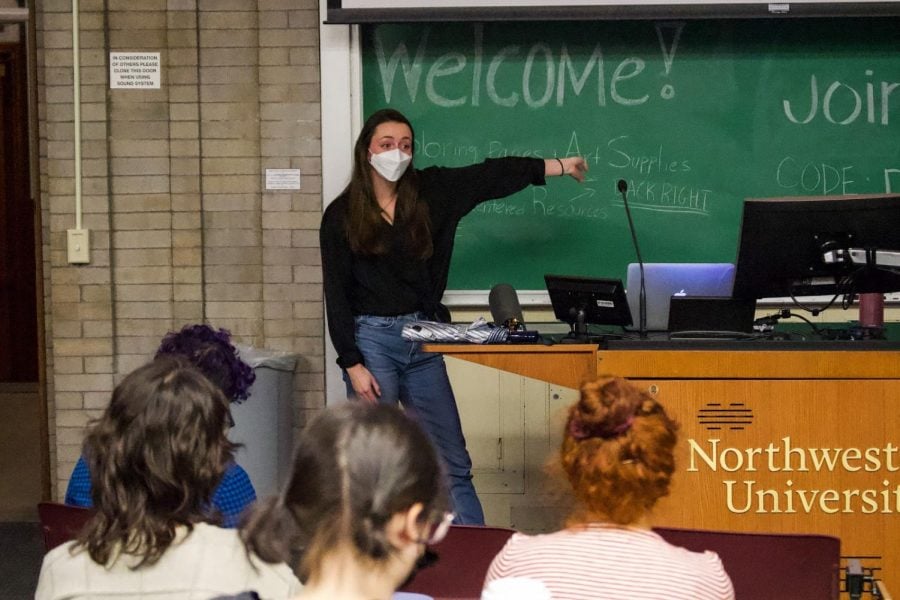Sex educator Riley Brennan discusses systemic issues with Greek life at NU College Feminists event
Alyce Brown/The Daily Northwestern
Activist Riley Brennan. They spoke about the role of Greek life on campus at a Wednesday event hosted by College Feminists.
November 19, 2021
Content warning: This story contains mention of sexual assault, racism and rape.
Activist, sex educator and former Kappa Kappa Gamma member Riley Brennan spoke about the systemic harm Greek life causes at a Wednesday event.
Hosted by Northwestern University College Feminists, Brennan also asked students to reflect on Greek life’s role on campus. Brennan shared their experience joining a sorority at Simpson College to an audience of about 15 people.
“I don’t regret my experience in a sorority, but I regret my participation in the system and being complicit in the system,” Brennan said. “I (don’t) need 100% of people to come in loving Greek life and leave ready to burn it all down. ”
The event took place amid ongoing student advocacy to permanently remove Greek life from NU’s campus. The Abolish NU Greek Life movement gained momentum in summer 2020. Earlier this quarter, students advocated for the eradication of NU Greek life at a September protest following multiple reports of alleged druggings at the Sigma Alpha Epsilon and Alpha Epsilon Pi fraternity houses.
Brennan opened the event by asking attendees to respond to a series of poll questions to get a sense of the NU community. When asked if students in Greek life receive special privileges, only one attendee said they don’t. Only one student said Greek life is a positive element of NU’s campus.
Weinberg senior Shreya Chimpiri, vice president of College Feminists, said this conversation on campus is part of a bigger picture.
“I think this is a conversation that will be had on campus for decades, honestly, because of how ingrained Greek life is in Northwestern and the collegiate system,” Chimpiri said.
Brennan also emphasized the importance of acknowledging and crediting the work of women of color, referencing a definition for feminism created by Black feminist theorist bell hooks.
“It’s super important that we are always acknowledging that Black women, Indigenous women, women of color, trans and queer people have laid the groundwork for literally any social movement in the United States,” Brennan said. “It’s all from them, we owe it all to them, we must compensate them and credit them at absolutely every opportunity.”
Weinberg junior Susan Jeon, president of College Feminists, said she appreciated the clarity defining feminism and identifying harmful behavior.
Jeon also dedicated an area of the room to resources for survivors of sexual assault, to support those who might need to step away from the conversation.
“My biggest takeaway is that it’s okay to call people out on things and that if someone is being racist (or) if someone is a rapist, to call them that because identifying and labeling things is helpful for people,” Jeon said.
Brennan said sororities were founded as a space for empowerment and self-advocacy when white women were first allowed to attend college. While universities evolved and began accepting people of color, sororities maintained their exclusivity.
They said both fraternities and sororities uphold the patriarchy and contribute to racist, classist, ableist and homophobic systems. Brennan cited elevated rates of sexual assault and economic barriers within Greek life and traditions that create a competitive culture and encourage women to “police” each other.
She recalled her sorority’s lack of response to one of her sisters posting something racist on social media. Because the chapter valued “having each others’ backs,” the student was not held accountable.
“We’re having this meeting about, ‘Should we kick this girl out?’” Brennan said. “This girl stands up and is crying, like sobbing, she says, ‘I thought that we were all about loyalty?’ And I’m thinking, ‘Yeah, loyalty to our other values and loyalty to women and being good people.’”
Brennan said none of Greek life’s benefits are inherently exclusive to the system and encouraged students to create alternative spaces, like clubs and interest groups, that offer those opportunities.
They said an immediate eradication of fraternities and sororities would cause such institutions to continue unofficially with less accountability. But she advocated instead for building stronger communities and gradually breaking down Greek life systems.
“(NU is) a community of truly outstanding and incredible people who are generally left-leaning and want to uphold values of good global citizenship, want to go out into the world and do good,” Brennan said. “The values or systemic issues that Greek life represents are not consistent with this campus.”
Email: isabelfunk2024@u.northwestern.edu
Twitter: @isabeldfunk
Related Stories:
— Sex Week 2021 explores healing through sex and intimacy
— College Feminists host Take Back the Night week, organize virtual and in-person events



